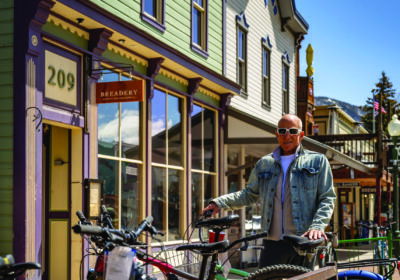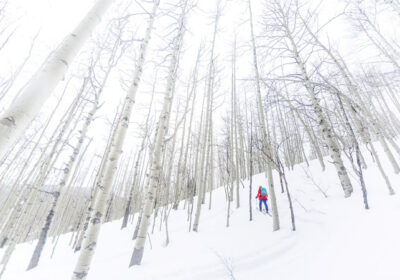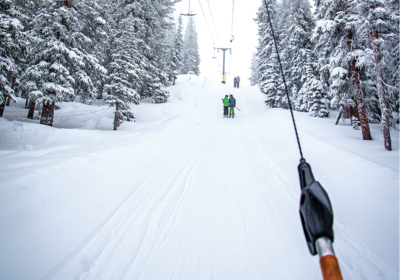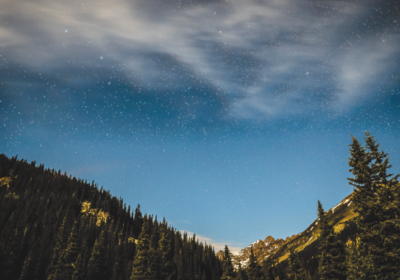
Nature fix
By Cassie Pence
Slow down and discover how a stroll through the woods can boost immunity and even answer life’s questions
Tammie Slack invites me to walk slowly through a swath of forest, and she means really slowly, careful not to raise my heart rate. “As you walk slowly through the forest, I invite you to find the tiniest things that are in motion,” she says.
I walk softly on a familiar stretch of the Lower Loop in order to walk slowly and experience Forest Bathing, for which Slack is a local guide. Up on my toes and light on my heels the forest begins to come into focus. I see busy bees. I see an ant carrying a white egg on an aspen branch. I see a blade of grass quiver. I see the shadow of sagebrush sway from left to right. I feel the breeze. I notice more than I ever do on the Lower Loop because I have a simple, yet intentional invitation to do so. I also feel extremely relaxed.
Most of the time, I am the one in motion. I am zooming over single track. I am pumping Lizzo through my headphones on a trail run. I am hiking and chatting like crazy to catch up with girlfriends. But in this moment, slowing down to be mindful in nature, something magical happens. I connect with it through my senses of sight, hearing, taste, smell and touch.
“Forest Bathing reduces blood pressure. It reduces cortisol levels, the body’s stress hormone. It increases your natural killer cells by 40 percent, boosting immunity. It increases vigor. It improves your sense of wellbeing. It increases focus, and it’s huge for depression,” Slack says, rattling off the proven benefits of spending time in nature.
Forest Bathing hails from Japan, where it’s called shinrin-yoku. Shinrin means forest and yoku means bath. The practice literally means taking in the forest atmosphere through our five senses. The “invitations” your guide gives you — prompts like “use your body radar to find a tree that is calling you and tell it your story” or “see how many ways you can cover a rock with your body” are mindfulness techniques, ways to engage the senses.
“You’ll be amazed, at the end of a Forest Bath ceremony, you’ll be making up your own invitations to use on your own hike or bike,” Slack says.
This idea that nature makes us feel good is nothing new. “Nature has always played a big part in spiritual seeking,” local WildNature Life Coach Sandy Shea said, who first realized the correlation of feeling good and being in nature in the 1970s when he trained with NOLs wilderness school.
As a life coach, Shea uses similar techniques to forge a “nature-connection” within his clients. He asks them to notice a plant, the flower and leaves. Does it make a sound? Maybe, if a bee is there. Or look at the stand of trees. Is one taller, thinner, branchier? Shea uses nature as a tool to help his clients quiet the mind, calm the nervous system and be present, so they can see, with their own inner intelligence, their deeper wants, needs and goals. Should I take a new job and move? Should I stay in a relationship? Or maybe it’s a whole life transformation they are seeking.
“We take that question into nature, and nature does all the work. Nature reflects exactly what we need to know at exactly the right moment,” Shea says. “I’m asking them to see the metaphor, the life metaphor, in the trees.”
Shea admits that this idea that the forest is a mirror is a bit “magical,” but I experienced it first-hand during Forest Bathing. When invited to “find a being and move like it,” I discovered that I didn’t want to be the busy bee. I didn’t want to be the fast ant. I didn’t even want to be the dancing white butterflies, and I love to dance. I wanted to be the tree — still and grounded. I wanted to be near the river and feel its cool air and feel the wind blow around me. What was this telling me about the busyness of my life? It was a mirror.
Magic aside, Shea also shares about the science of nature’s influence on your health, happiness and vitality.
“Evergreens release phytoncide, the aroma of the forest, which is very calming and lowers stress. And studies show just a few-hour hike can have long lasting benefits: it actually changes your blood chemistry,” Shea says.
No matter if you use a coach, a guide or just take yourself out into the woods, it’s all about bridging the gap between us and the natural world. Slack points out that “it’s only been 200 years since we’ve been living in concrete.” And Shea echoes her thought, “people forget that we humans come from nature. It’s home, and once you realize that connection, nature has huge psychological benefits.”







